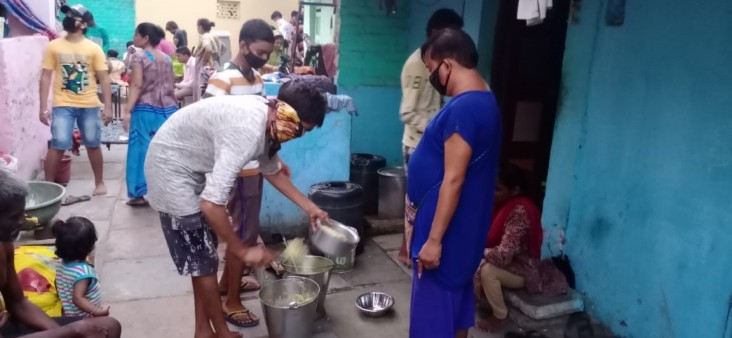India
- History
- Our Work
- Transforming Development Through Innovation & Partnership
- U.S.-India Triangular Cooperation
- Partnership for Energy Access and Security
- Partnership for Sustainable Forests in India
- Partnerships for Health
- Partnership for Education
- Partnership for Water Sanitation and Hygiene (WASH)
- Partnership for Food Security
- Partnership for Gender Equality
- Investing in Afghanistan
- Foreign Assistance Data
- Newsroom
- Newsletters and Fact Sheets
- Speeches
- Resources For Implementing Partners (RFIP)
- Careers
- Partnership Opportunities
- Success Stories
Speeches Shim

During the COVID-19 pandemic, USAID programs working in outbreak hot spots in India provide crucial assistance to urban slum dwellers.
“Cooking and delivering food to their doorsteps is the surest way that these families are fed. If people don’t eat, how can they fight a pandemic?”, said Jagdish Bhai Dantania as he wiped off the sweat from his face on a hot, steamy night in a slum settlement called Nagoriwad.
Nagoriwad is situated in the historical walled city in Ahmedabad, Gujarat, packed with more than 400 cramped, semi-stable houses. That day, Jagdish and seven other volunteers cooked and delivered hot meals to 150 of the most vulnerable people in Nagoriwad from the kitchen he had set up in the community’s open area. They have been doing this for the last 10 days.
“These people are widows, the elderly, people with disabilities and people without any government-issued ration cards,” Jagdish added. Jagdish Bhai Dantania has been working with USAID’s Moving India Towards Sanitation for All (MISAAL) activity for six months. The MISAAL activity helps ensure the delivery of basic sanitation and hygiene services to urban slums through its sanitation committees, whose members regularly coordinate with both the local government and slum dwellers to increase the number of individual household toilets and refurbish sewer lines in the settlements. They also train residents in effective sanitation and hygiene practices.
Since India went under a nationwide lockdown on March 25, 2020, the livelihoods of the urban poor population living in slums was hit especially hard by the movement restrictions. Many of them are daily-wagers and have been struggling to fulfill their essential needs in food, water and personal hygiene. Nagoriwad became a containment zone as Ahmedabad became a hot spot of the outbreak. The Gujarat government installed severe movement restrictions and periodic curfews in the containment zones. Although the Indian government swiftly provided food rations to those in need, there have been many challenges in delivering them to the people in a safe and timely manner.
USAID’s MISAAL activity helped the government overcome some of the challenges. In Nagoriwad, Jagdish and his committee members identified and located the most vulnerable families in Nagoriwad on a map; surveyed and reported their needs to the government and Non-Governmental Organizations who wanted to help; and coordinated the delivery of the provisions to the communities. When social distancing was impossible at collection sites due to cramped space and dense population, they set up the community kitchen and mobilized volunteers to cook and deliver the food to the doorsteps of the families.
USAID-supported MISAAL sanitation committees across Gujarat, Rajasthan, and Odisha are taking similar actions in the slum settlements in which they operate. Approximately 12,500 people in these communities have received food with the assistance of these committees.The MISAAL sanitation committee members also help families without government ration cards to apply for them and facilitate expediting the processes when necessary. To date, it is estimated that 80-90 percent of the families received government-provided rations with the assistance of the committees.
In this unprecedented time of the COVID-19 pandemic, USAID activities like tMISAAL continue to operate, including in outbreak hot spots throughout India. We may not know when the pandemic will be over, but we do know that USAID and our implementing partners are working together to ensure people in the most disadvantaged communities will receive the help they need.

Comment
Make a general inquiry or suggest an improvement.